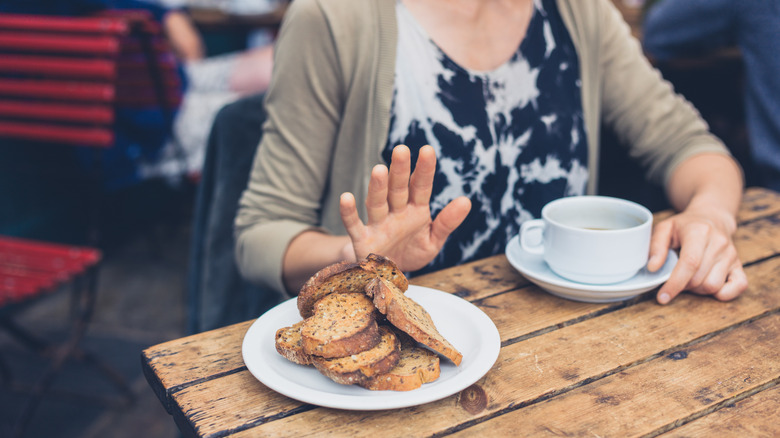Gluten Myths You Should Stop Believing
Gluten becomes a topic of concern if you find out that you have celiac disease, a wheat-related allergy, or non-celiac gluten sensitivity. Gluten is a naturally occurring protein found in wheat plants (like wheatberries, durum, and semolina) rye, barley, and triticale. For people trying to avoid it in their diet, the experience can often feel challenging — googling food types, checking labels, double-checking with wait staff at restaurants, etc.
If you've ever gotten into a conversation about gluten or looked into following a gluten-free diet, you're probably already aware of the many theories and myths surrounding this protein. From some people claiming that gluten-free diets are best for weight loss to others who believe that gluten is bad for just about everyone, there is a lot out there.
We set out to debunk some of these myths with the help of Katherine Basbaum, a registered dietitian at MyFitnessPal. Speaking exclusively with Health Digest, Basbaum clarified that gluten is, in fact, not bad for everyone. She also shared that avoiding gluten can be a lot harder than you think. It could take a bit of extra-scrutinizing of food labels. Let's take a look at some of the common ideas surrounding gluten and whether or not they hold true.
Myth: A tiny bit of gluten isn't a problem for people with celiac disease
Gluten is a problem for people with celiac disease because this difficult-to-digest protein makes its way to their small intestine and sparks off an autoimmune response. Diarrhea, stomach pain, bloating, gas, nausea, vomiting, fatigue, weight loss, mouth ulcers, joint pain, itchy skin rashes, and headaches are some of the symptoms of celiac disease.
It is inaccurate to think that just a small amount of gluten won't set off symptoms in someone with celiac disease, per Katherine Basbaum. "Even something as small as a tiny toast crumb that contains gluten can trigger a reaction in people with celiac disease, including digestive problems, rashes, and inflammation of the small intestine," explained the registered dietitian.
We're talking even just 10 milligrams of gluten a day or a 350th piece of bread, per the National Celiac Association. That's quite a small amount.
Myth: Gluten is easy to avoid because it's clearly listed on food labels
Not all products list allergen information, according to Katherine Basbaum.
"If a product claims to be gluten-free on the package, then it is a pretty safe bet that the product is indeed gluten-free. However, some products do not list allergen information, in which case it's important to look closely at the ingredients, some of which may not be obvious when it comes to spotting gluten," she explained. This becomes all the more important because most common foods contain gluten. Breads, cakes, pies, cereals, candy, cookies, French fries, pastas, gravies, salad dressings, and soups are examples.
It's important to know the names of different types of wheat and wheat flours, too. Some of them are durum, einkorn, emmer, kamut, spelt, farina, graham flour, and semolina. Then there are foods you didn't realize weren't gluten-free. Certain ingredients on food labels , for instance, aren't as easy to tell if they're gluten-free or not. "Some examples include the ingredients dextrin, malt, seasonings, modified food starch, and brewer's yeast," added Basbaum. The National Celiac Association has a list containing more such ingredients.
Myth: You will lose weight on a gluten-free diet
There could be a misconception surrounding losing weight when going gluten-free because people who avoid gluten could invariably end up cutting out processed foods and refined carbohydrates from their diet. Consumption of highly processed foods and a diet high in refined carbohydrates can lead to weight gain.
However, according to Katherine Basbaum, it is a myth to think that going gluten-free automatically means weight loss. "'Gluten-free' is not synonymous with 'low calorie'. In fact, many products marketed as gluten-free have more calories than the gluten-containing equivalent since more sugar and fat are often added to these products to make up for the lack of gluten," explained the expert. There might also be less fiber in these foods. Fiber is important for weight loss because it promotes gut microbial diversity and helps you feel full for longer.
In fact, gaining weight is one of the signs that going gluten-free is working for people with celiac disease, because their intestines are on the mend and they are able to better absorb nutrients (and therefore, calories). However, overconsuming meats, cheeses, and gluten-free desserts in an attempt to offset being deprived of other foods with gluten in them can lead to unwelcome weight gain. Even on a gluten-free diet, your overall diet and physical fitness are components that need to be considered for weight loss.
Myth: You have to stop eating gluten immediately when you suspect celiac disease
"Definitely not," says Katherine Basbaum. "When tested for celiac disease, what they are looking for are the antibodies to gluten. If you stop eating gluten before testing, those antibodies will diminish, which could result in a 'false negative' test result."
If you're experiencing symptoms that you think might be related to gluten intolerance, your healthcare provider will perform blood tests and check for damage in your small intestine. Blood tests can involve looking for antibodies in your blood, also known as serology testing, and genetic testing to look for the human leukocyte antigens HLA-DQ2 and HLA-DQ8. If you have dermatitis herpetiformis, which is a skin-related manifestation of celiac disease, your skin tissue could be examined as well.
If celiac disease is diagnosed, your doctor will want to check your nutritional status and bone health. It is only after all of these that you will be required to follow a gluten-free diet, which you will likely have to continue for the rest of your life. Talking to a dietitian about gluten and how it affects your health can help you navigate your diet going forward.
Myth: Gluten is bad for everyone
The marketing around going gluten-free, celebrity endorsements of how a gluten-free diet changed their lives, real-life stories of people with gluten intolerance and sensitivities, the notion that gluten-free goods are healthier because they're pricier, and even the fact that gluten causes inflammation in people with celiac disease could prompt people to think that gluten is best avoided by everyone.
However, Katherine Basbaum shared that only around "6% of the U.S. population is gluten intolerant and only about 1% have celiac disease," per research. Gluten is, therefore, not bad for everyone.
"For the majority of us that can tolerate gluten, there is no reason to avoid it, as foods with gluten offer beneficial nutrients such as protein and soluble fiber (the kind that can help lower bad cholesterol and keep blood sugar in check)," added the expert. You will also find that you're getting the benefits of foods fortified with folic acid, iron, and B-vitamins. Gluten-free foods are not typically as fortified with such nutrients. So there you go. Now, you can identify the gluten-related nutrition myths you can stop believing the next time the conversation comes up at the dinner table.





